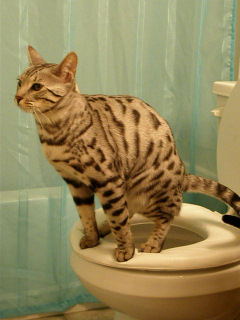Potential Risks of Flushing Cat Poop Down Your Toilet - Tips for Better Disposal
Potential Risks of Flushing Cat Poop Down Your Toilet - Tips for Better Disposal
Blog Article
Are you currently on the lookout for resources on How to Dispose of Cat Poop and Litter Without Plastic Bags?

Introduction
As feline proprietors, it's vital to be mindful of how we throw away our feline good friends' waste. While it might seem practical to purge pet cat poop down the commode, this method can have damaging effects for both the atmosphere and human wellness.
Environmental Impact
Purging feline poop presents harmful microorganisms and parasites right into the supply of water, posing a considerable threat to aquatic ecological communities. These impurities can negatively affect aquatic life and compromise water quality.
Health and wellness Risks
In addition to ecological problems, purging pet cat waste can additionally posture health dangers to human beings. Pet cat feces might have Toxoplasma gondii, a bloodsucker that can trigger toxoplasmosis-- a possibly severe disease, especially for expectant ladies and individuals with weakened body immune systems.
Alternatives to Flushing
Luckily, there are much safer and more liable ways to dispose of cat poop. Consider the complying with choices:
1. Scoop and Dispose in Trash
One of the most common approach of taking care of feline poop is to scoop it into a biodegradable bag and throw it in the garbage. Make sure to use a specialized clutter inside story and throw away the waste quickly.
2. Use Biodegradable Litter
Opt for biodegradable pet cat trash made from materials such as corn or wheat. These litters are environmentally friendly and can be safely gotten rid of in the trash.
3. Bury in the Yard
If you have a yard, take into consideration burying feline waste in a designated location away from vegetable yards and water sources. Be sure to dig deep enough to prevent contamination of groundwater.
4. Install a Pet Waste Disposal System
Purchase a family pet garbage disposal system particularly created for feline waste. These systems use enzymes to break down the waste, decreasing smell and ecological impact.
Verdict
Accountable animal possession prolongs past offering food and sanctuary-- it also includes proper waste monitoring. By avoiding purging pet cat poop down the commode and choosing alternative disposal methods, we can reduce our ecological impact and shield human health and wellness.
Why You Should Never Flush Cat Poop Down the Toilet
A rose by any other name might smell as sweet, but not all poop is created equal. Toilets, and our sewage systems, are designed for human excrement, not animal waste. It might seem like it couldn’t hurt to toss cat feces into the loo, but it’s not a good idea to flush cat poop in the toilet.
First and foremost, assuming your cat uses a litter box, any waste is going to have litter on it. And even the smallest amount of litter can wreak havoc on plumbing.
Over time, small amounts build up, filling up your septic system. Most litter sold today is clumping; it is made from a type of clay that hardens when it gets wet. Ever tried to scrape old clumps from the bottom of a litter box? You know just how cement-hard it can get!
Now imagine just a small clump of that stuck in your pipes. A simple de-clogger like Drano isn’t going to cut it. And that means it’s going to cost you big time to fix it.
Parasitic Contamination
Believe it or not, your healthy kitty may be harboring a nasty parasite. Only cats excrete Toxoplasma in their feces. Yet it rarely causes serious health issues in the cats that are infected. Most people will be fine too if infected. Only pregnant women and people with compromised immune systems are at risk. (If you’ve ever heard how women who are expecting are excused from litter cleaning duty, Toxoplasma is why.)
But other animals may have a problem if infected with the parasite. And human water treatment systems aren’t designed to handle it. As a result, the systems don’t remove the parasite before discharging wastewater into local waterways. Fish, shellfish, and other marine life — otters in particular — are susceptible to toxoplasma. If exposed, most will end up with brain damage and many will die.
Depending on the species of fish, they may end up on someone’s fish hook and, ultimately on someone’s dinner plate. If that someone has a chronic illness, they’re at risk.
Skip the Toilet Training
We know there are folks out there who like to toilet train their cats. And we give them props, it takes a lot of work. But thanks to the toxoplasma, it’s not a good idea.

Do you really like reading up on How to Dispose of Cat Poop and Litter Without Plastic Bags? Make feedback down the page. We'd be interested to hear your views about this article. Hoping that you visit us again in the near future. Loved our article? Please share it. Let somebody else locate it. Many thanks for taking the time to read it.
Call Today Report this page